
Taking charge of your Chronic Nasal Polyps (CRSwNP)
When it comes to treating and managing your CRSwNP, there are many options available to you. From medications to lifestyle adjustments and surgery, understanding the possibilities can empower you to take charge of your health.
Being proactive and talking with your doctor about all the ways CRSwNP affects you will help
them suggest the best possible treatment to
meet your needs.

Exploring your treatment options
Once you’ve got your diagnosis, the next step is to work with your doctor to create a treatment plan. The goal is to reduce your symptoms, prevent them from coming back (recurrence), and help make CRSwNP a smaller part of your life.
These are the treatment options doctors may use to help manage your symptoms:
- Reduce the inflammation that causes CRSwNP
- Shrink polyps
- Make breathing easier
- Improve your sense of smell
- Reduce the need for steroids
- Can reduce swelling, congestion and polyp size
- Are used daily for the best results
- May have side effects (e.g. nosebleeds, nasal irritation) that are usually mild and temporary
- Can be used long-term (with doctor’s guidance)
- Fluticasone propionate
- Mometasone furoate
- Budesonide
- Beclomethasone dipropionate
- Triamcinolone acetonide
- The surgery is usually done under general anesthesia
- A thin, flexible tube with a tiny camera (endoscope) is used to look inside your nasal passages
- Tiny tools are used to remove any polyps or tissue blocking your airways
- You can expect your nose to feel sore or uncomfortable for a few days after the operation
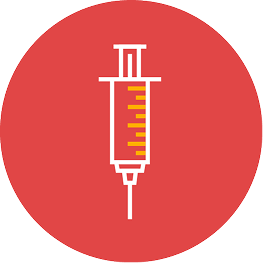
Biologics are medications that target specific parts of your immune system to reduce the inflammation that causes your CRSwNP. The medicine is taken by injection under the skin (subcutaneous injection) and could be administered at different time intervals.
Biologics can help:
Your doctor would be able to suggest the best biologic for you based on your symptoms.
Like any medication, biologics may cause side effects. Your doctor will be able to discuss with you the most common ones, which may include injection site reactions, eye and eyelid inflammation, headache, joint pain, and tiredness.
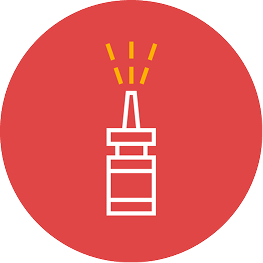
Nasal sprays
Corticosteroid (or steroid) nasal sprays tend to be one of the first treatments that doctors prescribe for CRSwNP. The sprays start working in a few days, but it may take several weeks before you get the full effect.
Steroid nasal sprays:
Nasal steroid medications commonly prescribed for CRSwNP include:
Tablets (oral corticosteroids)
If your CRSwNP is severe, your doctor may prescribe oral corticosteroids. These medications are typically taken for a limited time and under close medical supervision due to the potential risks associated with prolonged use. These include infections, weakened bones, increased blood pressure, increased cholesterol, and issues with your eyes, liver and abdomen.

If other treatments haven’t improved your symptoms, you may have been referred to an Ear, Nose and Throat (ENT) specialist for surgery to remove your nasal polyps.
Here is a quick overview of the procedure:
It’s worth remembering that surgery only treats the symptoms of CRSwNP, it doesn’t tackle a cause of the disease, which in many cases is Type 2 inflammation. You may find that even after surgery, your symptoms may return.
This recurrence can be caused by many things, including the underlying inflammation in your body, incomplete initial surgery, or not following the correct medical therapy after surgery.
By treating a cause of the condition – Type 2 inflammation – many symptoms can improve
Your treatment journey
There are several treatment options available, each with its strengths in addressing specific symptoms.
The image below is an overview of the different treatment types that are likely to be effective in addressing some of the primary symptoms of CRSwNP at different steps of your treatment journey. You can use this as a starting point for conversations with your doctor about finding the best option for you.
Initial treatments
- Some of the first treatments for low symptom severity
- Saline and steroid nasal rinses and sprays are common options
Systemic steroids
- Prescribed type of treatment for disruptive or prolonged symptom severity
- Usually delivered orally and occasionally through injections for a short time
Surgery
- Performed after high and persistent symptom severity
- Used when previous treatments have failed
Biologics
- Prescribed for recurring nasal polyps and symptoms
- Injectable medications that treat the underlying inflammation.

Talk with your doctor
Use this handy guide to support conversations with your doctor about the best treatment and management options for you.
Self-managing your condition
- Overuse of nasal decongestant sprays | Can lead to a condition called rhinitis medicamentosa, or ‘rebound congestion’, which makes congestion worse, rather than better.
- Incorrect nasal irrigation | Having the wrong technique or using dirty water may lead to infections or irritation of the nasal passages.
- Potential interactions | Some herbal remedies or dietary supplements may interact with prescription medications or make other health conditions worse.
Remember, before trying any treatment – including non-medical remedies – it’s important to seek medical advice from a doctor, nurse, or pharmacist, to check that it’s ok for you.
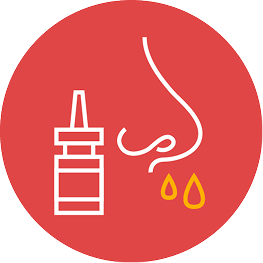
Nasal irrigation with saline solution | Can help clear mucus and reduce inflammation.
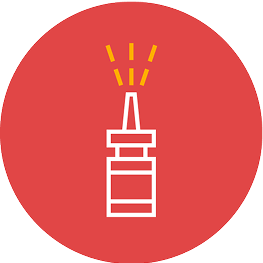
Over-the-counter treatments | May provide temporary relief from nasal congestion and associated symptoms.

Avoiding triggers | Allergens, irritants and certain foods can make CRSwNP symptoms worse.
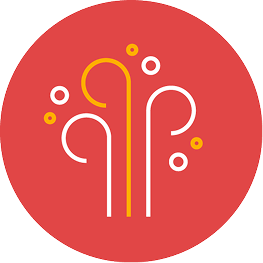
Using a humidifier | Can help reduce nasal congestion and improve breathing.

Good hygiene | Can reduce the risk of respiratory infections that can make CRSwNP symptoms worse.
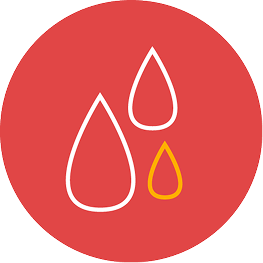
Hydration | Keeping the body hydrated and help make mucus thinner.
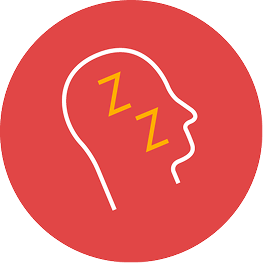
Sleeping with your head elevated | Can help reduce nasal congestion and stop mucus from dripping down your throat.

Stress management | Stress-reduction techniques or relaxing activities may improve symptoms.
If you are thinking of trying any at-home measures, make sure you chat your plans through with your doctor, nurse, or pharmacist, so you can be certain they’re safe and effective.
It’s good to be aware of some of the risks associated with at-home management:
IMPORTANT: You should never try and remove your nasal polyps yourself. Polyps must be surgically removed by an ENT surgeon as they are under the deep skin layers of the nose.
Check your symptoms
Our handy symptom checker can help you assess whether your CRSwNP is under control. It’s a simple questionnaire that asks you about your symptoms and how they’re affecting you. You can then share your results with your doctor so you get the right treatment and care for you.
What happens if you don’t treat CRSwNP?
Sometimes you might feel like you just want to forget about CRSwNP and get on with things which is understandable.
Bear in mind however, that CRSwNP is a chronic condition, and if you leave your symptoms untreated, they could persist or get worse, potentially leading to:

More or bigger polyps
Affecting your ability to breathe or smell.

Higher risk of sinus infections
Requiring extra treatment like antibiotics.

Reduced quality of life
Symptoms may impact your sleep, mood, work or leisure activities.

Other health problems
Conditions like asthma
may get worse.